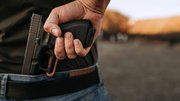Article
2001: A space
For the ATM industry, 2001 was a year filled with the good (proactive response to the ADA issue), the bad (high-profile collapse of Credit Card Center) – and the just plain strange.
January 9, 2002
Here are some of this editor's favorite goofy ATM-related stories of 2001:
Powdered sugar is not, repeat not, a biohazard: Lake Worth, Fla. police believe that an ATM user eating breakfast in a hurry was the likely cause of white powder found on a Bank of America ATM. According to a Dec. 20 report in the Palm Beach Post, a nervous ATM user called police after finding the powder early in the morning. Police, deciding to play it safe, collected some of the powder and sent it for testing at a lab in Miami. No one was injured by the powder, but a bank employee with asthma was taken to the hospital after inhaling fumes from the chlorine used to decontaminate the ATM. "We don't know what the material was," Lake Worth police Sgt. Charles Kane told the Post. "It could have been someone stirring their cream into their coffee, or maybe someone just eating a powdered doughnut."
The next Furby?: Not one but three companies – Mattel, Fisher-Price and Summit Financial Products – sold toy ATMs during the 2001 holiday season. Summit's ATM Savings Bank, with a suggested retail price of $29.99, sold out on Amazon.com. Mattel's pink Bank With Me Barbie is part of the company's Consumer Products line, along with the Shop With Me Cash Register, Learn With Me Laptop and Talk With Me Smart Phone. With a suggested retail price of $49.99, it comes complete with "ATM card," stack of pretend cash and quiz cards designed to teach arithmetic and other skills. Both the Summit and Mattel ATMs accept real cash and so can be used as banks. Fisher-Price's Sesame Street Money Machine, which features Big Bird, Cookie Monster and Elmo, is designed for preschoolers and retails for $19.99.
But can Santa get it down the chimney?: FAO Schwarz featured what it described as a "personal ATM" on page 159 of its holiday Ultimate Toy Catalog. The Triton 9600, complete with customized topper, was sold through Triton distributor Access to Money, which would provide 10 ATM cards and, for those interested in dispensing real cash, processing and support services. Priced at $20,000, the 9600 cost $8,000 more than a miniature Mercedes 500SL sedan but $10,000 less than an African safari travel package also featured in the catalog.
It's raining cash: A stream of $20 bills rained down on a St. George, Utah street after an absent-minded ATM service tech drove off to make a deposit in a neighboring city – without realizing he had left a bag filled with cash sitting on a tool box in the back of his pickup. According to a Nov. 20 report in the Salt Lake Tribune, alert motorists noticed the flying bills and retrieved about $3,000, which was turned over to police. The tech told authorities he didn't miss the money until he stopped to make his deposit. Police said they believed him and had no plans to further investigate the matter. Cliff Grossman, director of safety and risk management for Respond Inc., the tech's employer, told the Tribune, "Thank God [St. George] is such an honest community. This doesn't happen very often, but when it does, I'm glad there are honest people around.""urn:schemas-microsoft-com:office:office" />
Rage against the machine: A Nov. 14 WISC-TV report relayed the tale of a fellow who drove up to an ATM, beat it with an unidentified object, then got back in his car and drove away. An alert witness followed the man and called police. The suspect caused only minor damage and didn't get any cash; nonetheless, he was charged with criminal damage to property and possession of burglary tools.
A million lies: Dorothy Marie Livingston of Millerstown, Pa., on Sept. 18 was charged with 16 counts of theft by deception in connection with a series of incidents in July in which she deposited a bogus $1 million bill at an ATM – that's right, a single bill – then used other ATMs to transfer funds to other accounts. Alert tellers at First National Bank of Newport notified Fleet Bank, where Livingston was a customer, on the same day the phony bill was deposited, but it took several days to track her down. In the meantime, she was able to access $27,500, either by making withdrawals or by transferring to other accounts and writing checks. Livingston's forgery was less than convincing, according to a Perry County, Pa., police spokeswoman, who said, "It looked like something you'd get at Dollywood." The largest Federal Reserve bill in general circulation today is the $100 bill.
More rage against the machine: Tomah, Wis., police were called to the RIA Federal Credit Union on July 23 after tellers saw an unidentified 50-year-old man attempting to extricate his card from an ATM using a tire iron. According to the police report, the man couldn't get his card out of the machine after completing a transaction. He asked tellers for assistance and, when they told him they couldn't retrieve it until later that day, reportedly took matters into his own hands. During a search before placing him in the squad car, officers discovered a small bag of marijuana in his pocket. He was arrested on charges of damage to property and possession of marijuana. The ATM sustained more than $800 worth of damage.
How embarrassing: Sir George Mathewson, the multi-millionaire chairman of the Royal Bank of Scotland, fell for one of the oldest scams in the book while withdrawing cash from one of his own ATMs in London in July. Mathewson was withdrawing cash when two men approached him from behind. The men noted Mathewson's PIN, then tapped him on the shoulder to tell him he had dropped a five-pound note (approximately $7.07.) When Mathewson bent down to pick up the supposedly spilled money, the men grabbed his card and fled. In ATM circles, this practice is commonly known as "shoulder surfing" – one of the most low tech types of ATM crime. A Royal Bank spokeswoman said that Mathewson, who notified the police of the theft immediately, didn't lose any money.
Misplaced anger department: Customers of the Bank of New York got a sticky surprise on June 13 when they tried to withdraw cash from ATMs and found card slots jammed with plastic and keypads covered with glue. According to a New York Post report, ATMs at five branches in Nassau and Suffolk counties were vandalized by animal-rights activists who claim the bank does business with Huntingdon Life Science, a European company that tests pharmaceuticals on animals.
Not the sharpest knife in the drawer: Traffic violations were the least of a Berkeley, Calif., man's worries after he was questioned by East Bay Park police on June 11 when they noticed his red Honda Civic had no current registration. Upon questioning, police determined that the FBI was seeking Royland Rice in connection with the attempted robbery of a Wells Fargo branch in Orinda, Calif., on June 4. Rice had dropped his ATM card outside the bank while fleeing the scene. A witness identified the 47-year-old Rice in a lineup after his ATM card linked him to the attempted theft. An FBI agent told the Times that Rice was also under investigation in connection with several other California robberies. According to the affidavit for his arrest, Rice had two prior convictions for bank robbery.
It's the little things: A survey of 1,000 ATM users by Atlanta-based market research firm Synergistics Research Group found that their biggest frustration with ATMs was trying to read screens in the sunlight. A whopping 47 percent identified this as their biggest beef, followed by that old chestnut, excessive fees, mentioned by 40 percent of survey respondents. Two other items were directly related to ATM screens: screen too small, mentioned by 16 percent of users; and print too small, by 14 percent.
Not-so-funny guys: Two Greensboro, N.C., disc jockeys irked Gov. Mike Easley with their April Fool's Day prank involving ATMs. According to a Greensboro News & Recordreport, the jocks told listeners that the state was testing support for a new lottery system. They urged people to try the game by sticking their driver's licenses in any bank ATM, and told them the ATM would give them a lottery number and a shot at winning $250,000. If enough people played, the state supposedly would hold a lottery referendum. Easley, who had asked the legislature to consider a lottery to pay for education programs, issued a statement saying he had received telephone calls about the prank and was referring the matter to state Attorney General Roy Cooper. In 1999, the same radio show angered Greensboro officials on April 1 when DJs told listeners they had done such a good job conserving water that the city wanted them to run their showers for an entire day. Greensboro has a chronic water shortage.
Included In This Story
Triton Systems
Triton FI based products • NO Windows 10™ Upgrade • Secured locked down system that is virus/malware resistant • Flexible configurations - Drive-up and Walk-up • Triton's high security standards • NFC, anti-skim card reader, IP camera and level 1 vaults are all options • Triton Connect monitoring • Lower cost
 ChatGPT
ChatGPT Grok
Grok Perplexity
Perplexity Claude
Claude












